Of all the life skills available to us, communication is perhaps the most empowering.
Possessing strong communication skills is a critical component of success in the workplace. It's how we understand and convey images, thoughts, and opinions.
Becoming more effective in the workplace requires a combination of many different skills. These encompass verbal and non-verbal communication, active listening, problem-solving, effective questioning, negotiating, and persuading.
This article explores the essential communication skills that every job seeker should have.
Create your professional Resume in 10 minutes for FREE
Build My Resume
What is a Communication Skill?
Communication skills are the abilities that help us to effectively exchange information with other people. They involve speaking, listening, presenting, questioning, and writing. Being proficient in bringing ideas is an important part of winning in almost every job.
It's important to recognize that the ability to communicate applies to both verbal and non-verbal elements. This includes things like body language, tone of voice, facial expressions, eye contact, and gestures. All these things play a role in how we communicate.
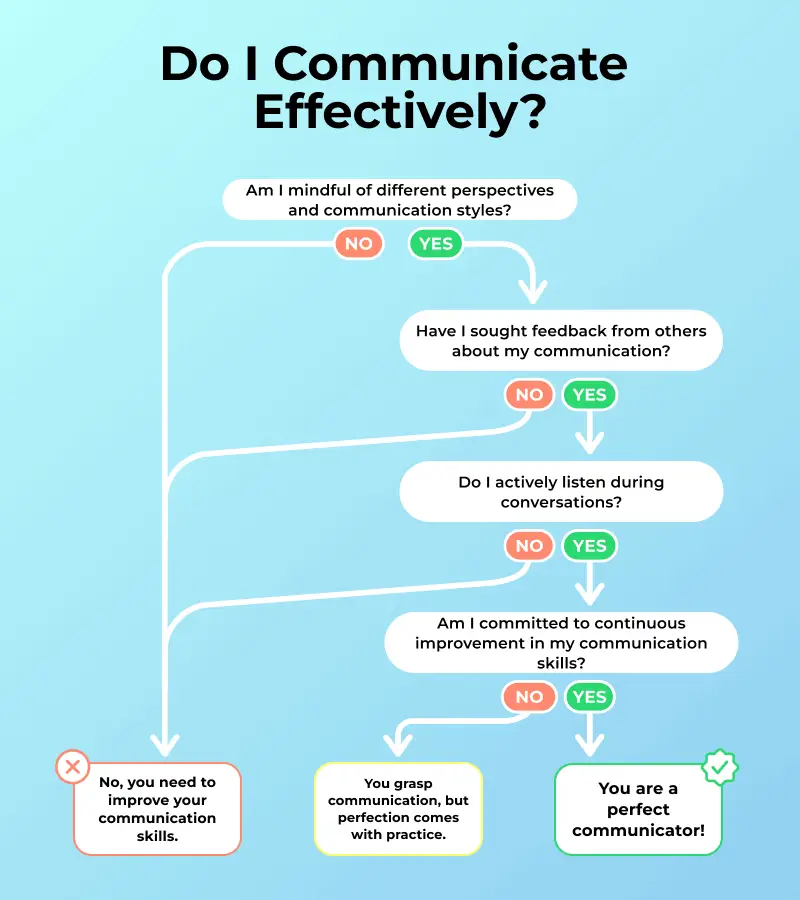
How to Communicate Effectively?
In teamwork, silence isn't golden, it's deadly.
Clear and consistent communication is vital for any job. It's the foundation of getting tasks done, understanding instructions, and formatting relationships with colleagues.
But communication does not solely consist of speaking and listening; additionally, grasping the message and expressing it articulately is important. This is what's known as effective communication.
Effective Communication:
- It demands actively listening, being clear when indicating an idea, and considering the thoughts and feelings of others. It also means asking questions to guarantee comprehension. During interactions with coworkers, it is critical to be respectful and courteous while still getting your point across.
- Employers look for candidates who have strong communication skills because they understand how valuable those are to a team. People who can communicate effectively can often resolve conflicts efficiently, correlate contacts with clients, and create a positive work environment.
- Good communication skills can also help employees do their jobs better on a day-to-day basis. They can ask clarifying questions to ensure they're on the right track, provide feedback that's both productive and encouraging, and give support to colleagues when needed.
- Consistently providing timely updates and transparent information helps maintain alignment across projects, preventing misunderstandings and promoting accountability.
Generally, effective communication is paramount for success in any job search. Good communicators are usually great problem-solvers, decision-makers, and team players than their counterparts who may struggle in this area.
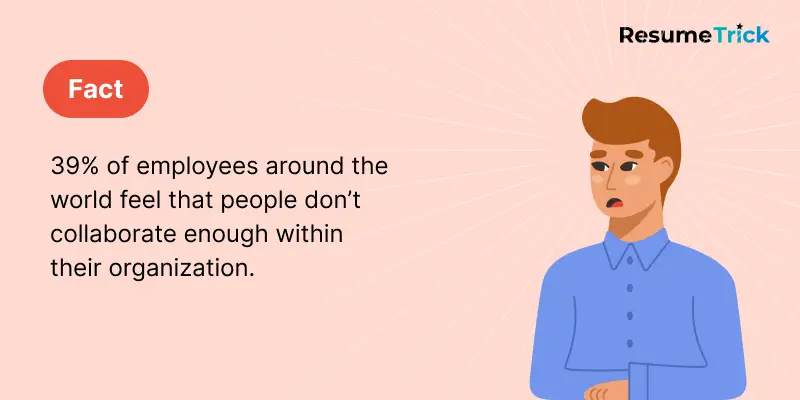
Types of Communication Skills
From conversing with customers and peers to demonstrating and penning, there are numerous forms of communication expertise necessary in the workplace.
Here are 7 communication skills types for a resume:
1. Verbal Communication Abilities
Verbal communication skills are the spoken abilities that enable individuals to convey information, express ideas, and interact with others effectively through words. In the context of job seeking, strong verbal skills are essential for a variety of interactions, including interviews, networking events, and workplace communication.
Clear articulation is a fundamental aspect of verbal communication. Job seekers should strive to express their thoughts in a concise and coherent manner, avoiding jargon or overly complex language. The ability to communicate with clarity not only enhances understanding but also reflects positively on one's professionalism.
2. Non-Verbal Communication Skills
Physical cues can be equally as important as the spoken language. It includes facial expressions, body language, tone of voice, and gestures.
Your body language can project confidence, enthusiasm, and professionalism. Stand up straight and make eye contact when speaking. Employ inviting motions like uncrossed arms. Avoid fidgeting or tapping your feet, which can indicate nervousness or impatience.
Facial expressions can convey many different emotions. A genuine smile can show friendliness and passion while maintaining a neutral expression can indicate being thoughtful or considering another position. Make sure your expressions match the tone of the conversation for maximum impact.
Observe people's gestures and countenance. If they appear uncomfortable or uninterested, adjust your approach accordingly.
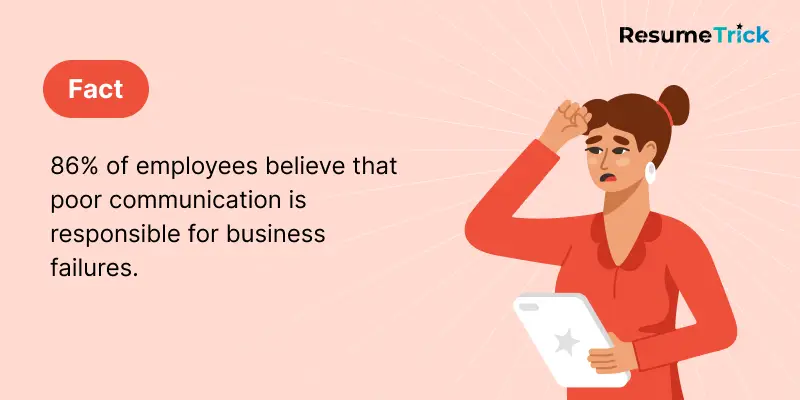
3. Written Communication Skills
Written communication skills are crucial for job seekers in creating a positive impression throughout the application process and in the professional arena. Writing a compelling resume and targeted cover letters requires the ability to express qualifications and interests clearly and persuasively.
Being concise involves conveying information in a brief and to-the-point manner. It requires eliminating unnecessary words and details while retaining the essential content.
Effective writers consider their audience when crafting messages. They tailor their language, style, and content to suit the needs and expectations of the intended readers.
Create your professional Resume in 10 minutes for FREE
Build My Resume
4. Presentation Skills
Presentation skills are a critical component of effective communication, encompassing the ability to deliver information in a compelling manner to an audience. Strong presenting skills can significantly improve a candidate's appeal during interviews, meetings, and professional interactions.
Delivery style is one of the most crucial aspects of presentational skills. Job seekers should pay attention to their tone, pace, and body language, aiming to project confidence and enthusiasm. Maintaining eye contact, using gestures purposefully, introducing action verbs, and varying vocal tones can captivate the audience's attention and convey a sense of credibility.
Handling questions and engaging in effective Q&A sessions are additional components of these skills. Candidates should be prepared to respond thoughtfully to inquiries, demonstrating a deep understanding of the subject matter and an ability to think on their feet.
5. Conflict Resolution Skills
Conflict resolution is a vital facet of basic communication skills, crucial for nurturing healthy relationships in personal and professional spheres. It involves acknowledging conflicts as natural occurrences and presenting opportunities for growth.
Understanding the root causes is pivotal, requiring active listening and empathy to grasp diverse perspectives.
Transparent and open communication, coupled with an awareness of non-verbal cues, forms the foundation. Shifting the focus from blame to collaborative problem-solving encourages compromise and flexibility, fostering sustainable resolutions.
Emotional intelligence plays a significant role, in helping manage emotions and cultivate empathy to navigate conflicts with understanding.
6. Digital Communication Skills
In the professional realm, digital communication is central to modern workplaces. Utilizing electronic transmission includes tools like email, instant messaging, and video conferencing (e.g., Zoom), enhancing collaboration and virtual meetings.

Mobile devices ensure constant connectivity, vital for flexible work setups. Security measures, such as encryption, address privacy concerns. The ongoing evolution of technologies like 5G and IoT presents opportunities for increased efficiency.
Despite these benefits, challenges include the need for digital literacy and effective information management. In summary, e-communication is indispensable for organizational efficiency, requiring professionals to adapt and leverage these tools in the dynamic world of work.
7. Listening Skills
Effective listening skills play a pivotal role, serving as a cornerstone for successful communication and collaboration in the workplace. Beyond the mere act of hearing words, listening involves a nuanced understanding, interpretation, and appropriate response to the messages conveyed by others.
One of the primary tenets of effective listening is active engagement. This goes beyond passive reception and requires full concentration on the speaker and a conscious effort to understand the statement.
When people talk, listen completely. Most people never listen.
Active listening is a fundamental skill in effective communication, fostering understanding, building trust, and promoting meaningful connections in both personal and professional relationships. It involves a genuine interest in the speaker's perspective and a commitment to creating a supportive and respectful communication environment.
List of Top Communication Skills
Communication proficiency is a necessity for achieving excellence in any vocation. To get ahead in the workplace, you must be adept at communicating effectively with colleagues, customers, employers, and anyone else you may come into contact with.
Here are the leading communication abilities that will empower you to perform outstandingly and achieve success in any job.
1. Confidence
Having confidence in yourself is needed for the effective exchange of ideas in the workplace. It allows you to speak up and not be afraid of being wrong.
- Confidence can be built through practice and self-reflection. Start by looking at your accomplishments and successes, however big or small. Recognize what you did well and build on it.
- Investing in self-awareness leads to greater confidence and the courage to take risks. You'll also be able to focus on solutions rather than on potential problems. -Train active listening skills. Take time to really understand your colleagues' points of view by asking questions, restating what they said, and providing feedback.
- Setting small, achievable goals regularly builds momentum, gradually increasing your comfort level and confidence in expressing ideas clearly.
2. Honesty
I motivate players through communication, being honest with them, having them respect and appreciate your ability and your help.
Honesty is essential to maintaining an open dialogue with colleagues, customers, and superiors.
Sincerity also makes it simpler to offer and accept criticism. When we're open with each other, it's easier to spot issues and find solutions. This helps teams work effectively and efficiently.
Instead of trying to hide or cover up mistakes, it's better to admit weaknesses quickly. This shows integrity and strengthens confidence between colleagues.
To build faithfulness in the workplace, be truthful even in difficult conversations. Realize what you know and don't know, and take responsibility for your actions. Don't be scared to confess when you're in the dark or need support.
Finally, remember that trustworthiness doesn't mean being blunt or insensitive. Respect others' feelings by speaking kindly and thoughtfully in any situation.
3. Clarity
Good communication is the bridge between confusion and clarity.
Clarity is one of the job communication skills that are fundamental to a productive discourse in the workplace. It implies ensuring that the message being sent is easily understood by the receiver. Ensuring everyone in a conversation is aligned to prevent misunderstandings.
It's likewise critical to apply good listening protocols. This means actively engaging with what's being said and asking questions. Doing so can help to ensure that you have a full understanding of what was said before answering.
Taking notice of physical signals when interacting with others is essential. Non-verbal cues, such as facial expressions, eye contact, and posture, can convey meaning and clarity.
4. Friendliness
Showing a kind attitude towards others makes them feel comfortable and appreciated.
- Be cautious of how you present yourself. Non-verbal signals such as body language can communicate generosity. Smile often, keep eye contact, and avoid crossing your arms or legs.
- Companionability also helps create rapport with clients or customers. Being courteous and helpful will make them feel welcome and valued. Take time to ask questions and show genuine interest in their needs. This will help establish a strong relationship that could lead to future business opportunities.
- Maintaining patience, especially when faced with misunderstandings or frustrations, demonstrates emotional maturity and strengthens trust within teams.
5. Audience Analysis
Cross-cultural communication plays a crucial role in achieving success in the workplace. Understanding different cultures and how people communicate within them can help you better understand your colleagues and customers.
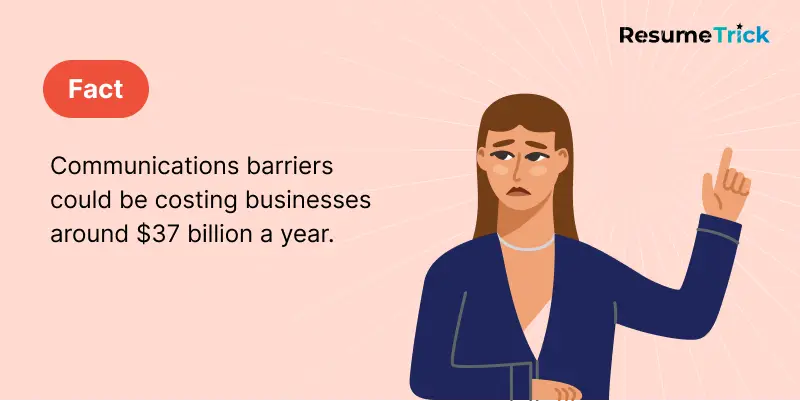
It is critical to acknowledge that communication practice approaches vary between cultures. What's considered polite in one culture might be seen as rude in another.
- To avoid misunderstandings, it's essential to learn about the cultural norms and adjust your communication accordingly.
- Stay aware of the language barriers that can arise when interacting with individuals of varied origins. When possible, use kinesics or gestures to get your message across. If a language barrier is present, try to find someone who speaks both languages to bridge the gap.
- In dealing with foreigners, you need to keep in mind that they have a different understanding of time. Certain societies could be more lenient with regard to punctuality, while others may consider it more important. It is paramount to know these differences so you don't offend anyone by being late or too early.
6. Enthusiasm and Patience
Eagerness is important for making a good impression in the workplace.
- Showing positivity and energy can be infectious, helping to boost morale and productivity.
- It's also important to show why do you want this position. Employers want to know that you care about the role and the company you work for.
- Patience is equally important in any job. You'll need to remain calm under pressure, whether dealing with customers or difficult co-workers.
Being patient means listening carefully and taking time to understand points of view before replying. This also requires the ability to tackle challenging circumstances without becoming agitated, which is a valuable skill in any workplace.
7. Feedback Acquisition
Communicate in a respectful manner — don't just tell your team members what you want, but explain to them why.
Awareness of giving and receiving responses is an important part of professional communication skills.
- Giving feedback should be done in a way that is constructive, specific, and focused on the task at hand. Concentrate on behaviors that can be improved, not on personalities. Aim to provide proactive advice and suggestions for improvement.
- Getting criticism can be difficult. Listen to what is said, take time to process it, and ask questions if needed. Be open-minded and take into account the comment you are given. If you do not agree, explain your point of view in an assertive manner.
- Delivering responses with tact and clarity ensures that your message is well-received, minimizing defensiveness and promoting meaningful dialogue.
If you need to give a negative estimation, use a sandwich approach - start with positive comments, then explain what needs to be enhanced, followed by any suggestions you have.
Be respectful when providing or taking critique and focus on the future rather than dwelling on the past. Avoid making assumptions or jumping to conclusions - ask to confirm that everyone is in agreement.
Finally, remember that evaluation is a two-way process; show appreciation for the feedback you receive and offer your own honest opinion when asked.
8. Empathy
Appreciation allows us to better understand our clients, making it easier to find common ground. By listening carefully and showing understanding, we can create a positive relationship that will be beneficial for both parties.
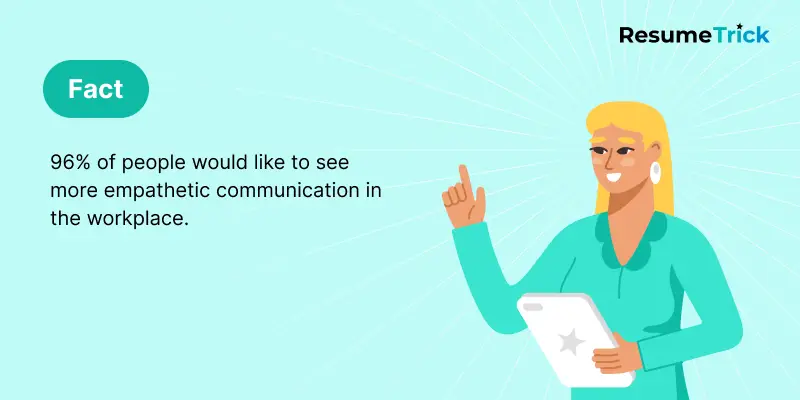
By putting ourselves in the other person's shoes, we can see the situation from their perspective. This allows you to respond constructively and find solutions that meet everyone's needs.
Overall, empathy plays a critical role in job success. It helps us foster positive connections with our co-workers, as well as navigate difficult conversations more effectively. Taking the time to listen and understand can make a huge difference in our interactions at work.
By honing above mentioned communication skills, you will be well on your way to success in any job!
Interview Communication Strategies
Job interviews serve as the pivotal moments where candidates can showcase their skills and personalities. Effective communication during an interview can significantly impact your chances of success.
Research the company
Understand the company's values, mission, products/services, and recent achievements. Tailor your responses to reflect how your skills and experiences align with the company's goals.
"I noticed that your company recently launched a sustainability initiative, which aligns perfectly with my background in environmental conservation. I'm excited about the opportunity to contribute to such meaningful projects."
Practice active listening
Pay close attention to the interviewer's questions and comments. Take a moment to process before responding, and ensure your answers directly address the question asked.
Interviewer: "Can you provide an example of a time when you had to resolve a conflict within a team?"
Response: "Certainly. In my previous role, there was a disagreement about project priorities..."
Highlight achievements
Structure your responses using the STAR method (Situation, Task, Action, Result) to provide specific examples of your accomplishments and problem-solving abilities.
"In my last position, we faced a tight deadline for a client project (Situation and Task). I took the initiative to reorganize our workflow (Action), resulting in completing the project two days ahead of schedule (Result)."
Ask insightful questions
Prepare thoughtful questions to demonstrate your interest in the role and company culture. Avoid asking questions solely about salary or benefits.
"Can you tell me more about the team dynamic within this department? How do team members typically collaborate on projects?"
How to Improve Communication Abilities?
Communication is a skill that you can learn. It’s like riding a bicycle or typing. If you’re willing to work at it, you can rapidly improve the quality of every part of your life.
Growing your skills is a vital part of succeeding in the workplace.
Here are some tips to help you:
- When speaking, aim for clarity, moderate pace, and use varied tones to convey emotions effectively.
- In written communication, proofread for errors, use clear language, and adapt your style to the audience.
- Develop your vocabulary by reading regularly and using tools like a thesaurus for alternative expressions.
- Public speaking skills can be honed through courses, groups, and consistent training in various settings.
- Familiarize yourself with digital communication platforms and practice effective email communication and virtual interaction.
- Attend workshops or sessions to enhance communication skills and take advantage of professional development opportunities.
- Role-playing scenarios can help in practicing needed skills, and feedback from participants is beneficial.
- Consider participating in forums, discussion groups, or social clubs to refine your verbal communication skills.
- Explore the use of humor appropriately in your communication to create a relatable atmosphere.
- Develop your self-confidence by setting small communication goals and gradually expanding your comfort zone.
Through the implementation of these concepts, you can use effective communication techniques in the workplace, resulting in better relations with coworkers and higher job satisfaction overall!
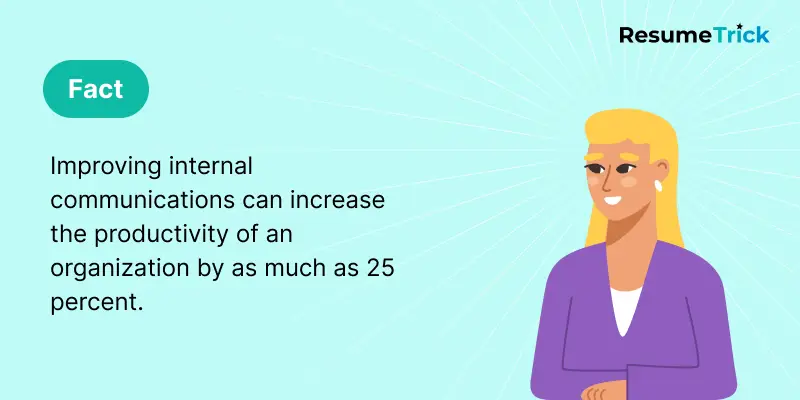
25 Jobs Requiring Strong Workplace Communication Skills
Communication aptitude is a necessity for any occupation. Whether it's speaking or writing, having the capability to communicate your thoughts, and feelings clearly is an invaluable asset in the workplace.
Here are 25 fantastic positions that demand outstanding communication skills.
| Job Title | Why it is important to communicate effectively? |
|---|---|
| Human Resources Specialist | For handling employee relations, and conducting interviews. |
| Public Relations Specialist | For managing relationships with the media, crafting press releases, and promoting a positive image. |
| Sales Representative | For success in sales and for building strong connections with clients. |
| Customer Service Representative | For addressing customer inquiries, resolving issues, and maintaining positive customer attitude. |
| Project Manager | To coordinate teams, provide updates, and ensure everyone is aligned with project goals |
| Marketing Coordinator | For creating marketing materials, coordinating campaigns, and collaborating with cross-functional teams. |
| Development Specialist | For designing and delivering training programs to enhance employee skills. |
| Executive Assistant | For scheduling executives, arranging meetings, and handling correspondence. |
| Management Consultant | To understand client needs, present findings, and implement recommendations. |
| Healthcare Administrator | For correlating healthcare services, managing staff, and interacting with patients and their families. |
| Educational Coordinator | For curriculum management, collaboration with teachers and students, and parent engagement. |
| Financial Analyst | To communicate sophisticated financial information clearly to clients, colleagues, and stakeholders. |
| IT Project Manager | For making sure all team members understand goals and timelines. |
| Social Media Manager | To engage with audiences, create compelling content, and manage online interactions. |
| Event Planner | For collaborating with clients, vendors, and team members to deliver successful events. |
| Legal Assistant | For drafting legal documents, communicating with clients, and cooperating with legal teams. |
| Technical Writer | To translate complex technical information into clear and understandable documentation. |
| Quality Assurance Specialist | To convey quality standards and collaborate with relevant teams. |
| Logistics Coordinator | For organizing the movement of goods and services with suppliers, transportation providers, and internal teams. |
| Real Estate Agent | To negotiate deals, market properties, and build relationships with clients. |
| Nonprofit Program Manager | To coordinate initiatives, collaborate with stakeholders, and secure funding. |
| Journalist | To gather information, conduct interviews, and present news stories effectively. |
| Interpreter/Translator | To facilitate communication across languages. |
| Environmental Scientist | For communicating scientific findings, writing reports, and engaging with policymakers |
| Retail Manager | For managing a retail operation with staff, customers, and vendors to ensure customer satisfaction. |
Resume examples with communication skills:
Importance of Communication Skills: Conclusion
Communication works for those who work at it.
Being proficient in communication is a must for any position. They facilitate us to capably articulate our ideas and cultivate contacts with our colleagues, superiors, and customers. It takes practice to advance excellent communication abilities, but it is well worth the effort.
By understanding the basics of verbal and non-verbal communication, we can better relate in a professional manner. Having the ability to interact clearly necessitates that we are straightforward and sincere. Being able to speak up and direct when needed, and having the courage to express ourselves can help us get our message across correctly.
In short, by enhancing our verbal and written abilities, we can create meaningful relationships with those around us, ensuring that everyone is respected and heard.
FAQ
- Where can I improve my communication skills?
- There are numerous resources available, including online courses, workshops, books, and professional organizations. Websites like Coursera, LinkedIn Learning, and local community colleges often offer classes on workplace communication.
- What are common barriers to effective communication?
- They include language differences, cultural misunderstandings, distractions, and emotional biases.
- How does technology impact communication abilities in the workplace?
- Technology provides various platforms for interaction, such as email, messaging apps, and video conferencing. While these tools enhance connectivity, they also require job seekers to be adept at digital communication etiquette.
- Can non-verbal communication vary across cultures?
- Yes, gestures, eye contact, personal space, and facial expressions may have various meanings in different cultural contexts. Being aware of these differences is crucial for effective intercultural communication.
.webp)









